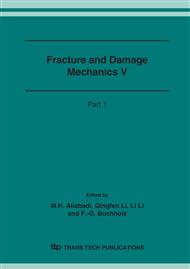p.29
p.33
p.39
p.43
p.47
p.51
p.55
p.59
p.63
Effect of the Welding Heat on Fracture Toughness and Fatigue Property in a Ti-Alloy
Abstract:
Ti-alloy is widely used in engineering because it possesses excellent specific strength and corrosion resistance. The effect of welding process on J-integral value and fatigue crack growth (FCG) rate in a Ti-alloy is experimentally investigated in this paper. A series of test is performed with SENB specimens for J-integral test and CT specimens for the FCG rate test respectively. Base metal, welded joint and HAZ materials were used to make different test specimens. Results show that the J-integral values of welded joint and HAZ are obviously smaller than those of the base metal. And that the FCG rate value of welded joint is much higher than those of base metal and HAZ material. It means that welding process may lead to a great reduction in fracture toughness and the fatigue property for titanium alloy. Therefore, the inhomogeneity of the welded joint must be considered when assess welded structures.
Info:
Periodical:
Pages:
47-50
Citation:
Online since:
November 2006
Authors:
Price:
Сopyright:
© 2006 Trans Tech Publications Ltd. All Rights Reserved
Share:
Citation:


